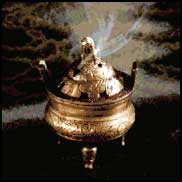 |
 |
|
|
|
||
 The history (or prehistory, we should say) of incense stretches farther back in time than any human civilization. Indeed, it can be said to be as old as fire itself. The burning of fragrant woods such as cedar, pine and cypress, and aromatic resins, roots, berries and other natural materials constitutes the true origin of incense. As these and other special substances were singled out and their unique properties distilled, the conscious practice of incense was born. The burning of incense is known to have occured throughout the ancient world: Mesopotamia, Phoenicia, Arabia, Egypt, India, Greece, Rome… all consumed incense in great quantities. References to incense are found in the ancient Sumerian Epic of Gilgamesh and feature prominently in the Old and New Testaments of the Bible. In the book of Exodus, for example, God instructs Moses to build an altar of fragrant cassia wood on which to burn a sacred mixture of frankincense, sweet spices and other aromatic substances. And in the Gospel of Luke we read the story of “wise men from the East” who present gifts of gold and incense to the infant Jesus. Indeed, the burning of incense features in the practice of most of the world’s religions, past and present, and often proliferated as they did. (NEXT) |
||